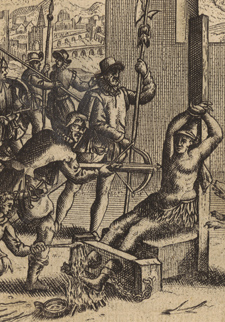
Vanished Worlds, Enduring People
Opening a Transatlantic World
When Christopher Columbus reached the Bahamas in 1492, he opened sustained contact between Europe and a hemisphere that would soon be christened “America.” This transatlantic connection brought dramatic changes to the lives of both Europeans and Native Americans, many of them well underway before the fifteenth century ended.
From their initial formulation, Columbus’s plans were essentially commercial enterprises, promising substantial returns for everyone involved. When India and the Spice Islands proved out of reach, the Admiral and his crews turned their attention to resources at hand, principally gold and native labor. Though some raised their voices and their pens in defense of the rights of Native Americans, they never succeeded in preventing Indian subjugation and exploitation.
Waves of Spaniards who roamed Caribbean lands in search of wealth were soon followed by equally avaricious English, French, Dutch, and Portuguese. A generation of European contact with the Caribbean shattered the region’s native cultures, and the Caribbean experience would provide a model for subsequent European actions in North and South America.